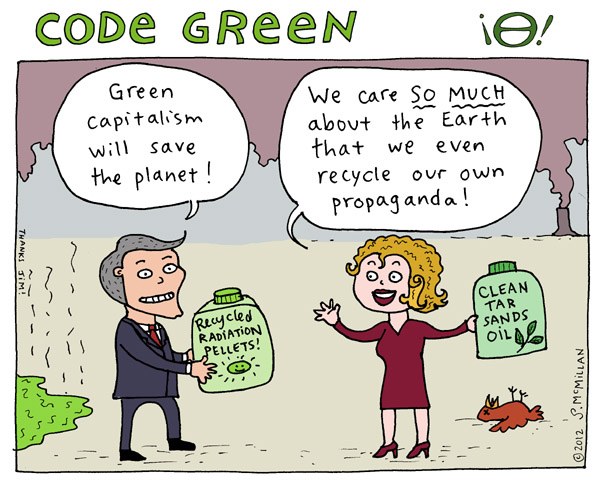2012 SkS Weekly Digest #28
Posted on 16 July 2012 by John Hartz
SkS Highlights
In Ivar Giaever - Nobel Winning Physicist and Climate Pseudoscientist, Dana thoroughly examines a presentation on climate change made by Glaever to the 62nd Meeting of Nobel Laureates in 2012. Dana shows that Giaever's contrarian climate opinions come from a position of extreme ignorance on the subject, as Giaever himself readily admits. This article generated the most comments during the past week.
What is the Climate Science Legal Defense Fund? by Doug Bostrom has also generated a lengthy and lively comment thread that is likely to continue for some time to come.
Toon of the Week

Recycled Propaganda
Source: Stephanie McMillan, Code Green.
Quote of the Week
Bill Clinton has warned that the US needs to cut its consumption of natural resources if it is to stave off the threats of climate change and rising prices.
The former president said the economy of the world's biggest consumer would recover faster from the recession and financial crises if more effort was made to use resources sustainably.
"We can grow even faster if we use less energy," said Clinton in a conversation with the Guardian at the Resource 2012 conference in Oxford on Friday evening. "We have studies that show this. All that we need to do is find ways to finance this."
Source: Bill Clinton: cutting use of natural resources would help US economy by Fiona Harvey, The Guardian (UK), July 13, 2012
Scientific Term of the Week
Extreme weather event: An extreme weather event is an event that is rare at a particular place and time of year. Definitions of rare vary, but an extreme weather event would normally be as rare as or rarer than the 10th or 90th percentile of the observed probability density function. By definition, the characteristics of what is called extreme weather may vary from place to place in an absolute sense. Single extreme events cannot be simply and directly attributed to anthropogenic climate change, as there is always a finite chance the event in question might have occurred naturally. When a pattern of extreme weather persists for some time, such as a season, it may be classed as an extreme climate event, especially if it yields an average or total that is itself extreme (e.g., drought or heavy rainfall over a season).
Source: Annex I (Glossary) to Climate Change 2007: Working Group I: The Physical Science Basis, IPCC Fourth Assessment Report.
The Week in Review
A complete listing of the articles posted on SkS during the past week.
- AGU Fall Meeting sessions on social media, misinformation and uncertainty (John Cook & Stephan Lewandowsky)
- Extreme heat becoming more likely under climate change by John Hartz
- Welcome to the Rest of Our Lives by greenman3610
- What is the Climate Science Legal Defense Fund? by Doug Bostrom
- Exxon-Mobil CEO Downplays the Global Warming Threat by Dana
- Ivar Giaever - Nobel Winning Physicist and Climate Pseudoscientist by Dana
- Carbon - the Huge and Yet Overlooked Fossil Fuel Subsidy by Dana
- New research special - cloud papers 2010-2011 by Ari Jokimäki
Coming Soon
A list of articles that are in the SkS pipeline. Most of these articles, but not necessarily all, will be posted during the week.
- New research special - methane papers 2010-2011 (Ari Jokimäki)
- An American Heatwave: The United States Glimpses its Hot Future (Rob Painting)
- Vision Prize Results (Dana)
- Yes, Virginia, There is Sea Level Rise (greenman3610)
- Nature has invented the ideal method to sequester carbon: coal (Sarah)
- The Mid-Wales floods of June 2012: a taste of things to come? (John Mason)
- Climate Change Cluedo: Anthropogenic CO2 (Tom Curtis)
- Mercury - The Hidden Danger of Arctic Warming? (Steve Brown)
SkS in the News
Dana's Carbon - the Huge and Yet Overlooked Fossil Fuel Subsidy was re-posted on Climate Progress.
SkS Spotlights
Sweden's Centre for Climate Science and Policy Research (CSPR) has rapidly established itself as a prominent reference point for studies related to climate science and policy research. The research is interdisciplinary and puts problems related to climate change in context with other measures for sustainable development, such as limiting environmental impact and responsible management of natural resources. CSPR’s mission is to develop knowledge, templates and methods for climate research in Sweden and internationally. In order to do this CSPR gathers researchers in the natural sciences, social sciences, humanities and in technology.
CSPR conducts climate research in four key areas:
- Climate Policy & Sustainable Development
- Knowledge and Communication
- Land Use & Energy
- Vulnerability and Adaptation
Inaugurated in 2004, CSPR was set up as a joint venture between Linköping University and the Swedish Meteorological and Hydrological Institute (SMHI), and is formally hosted by the Department of Thematic Studies at Linköping University.































 Arguments
Arguments























 0
0  0
0






Comments